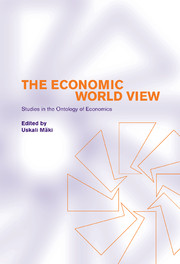Book contents
- Frontmatter
- Contents
- Notes on the contributors
- Preface
- I The what, why, and how of economic ontology
- II Rationality and homo economicus
- Part III Micro, macro, and markets
- 9 Essences and markets
- 10 The metaphysics of microeconomics
- 11 Ontological commitments of evolutionary economics
- 12 Is macroeconomics for real?
- 13 The possibility of economic objectivity
- Part IV The world of economic causes
- Part V Methodological implications of economic ontology
- Name index
- Subject index
9 - Essences and markets
Published online by Cambridge University Press: 04 August 2010
- Frontmatter
- Contents
- Notes on the contributors
- Preface
- I The what, why, and how of economic ontology
- II Rationality and homo economicus
- Part III Micro, macro, and markets
- 9 Essences and markets
- 10 The metaphysics of microeconomics
- 11 Ontological commitments of evolutionary economics
- 12 Is macroeconomics for real?
- 13 The possibility of economic objectivity
- Part IV The world of economic causes
- Part V Methodological implications of economic ontology
- Name index
- Subject index
Summary
Socialists and liberals have engaged in a long-standing debate in political philosophy about the desirability of markets. Those debates have focused on a series of questions about the market: the kind of moral character it fosters, its tendency to enhance or diminish human welfare, the distribution of goods it promotes, its relationship to political democracy and freedom, its compatibility with socialist goals, and so on. Recently, the very possibility of this debate has been questioned. The whole tradition of argument about the market is rejected on the grounds that it assumes an “essentialist” view of the market. Both defenders of the market and its traditional socialist critics assume that it is possible to talk of “the market.” They assume that different markets share some essential nature such that one can engage in a general discussion of the relation of the market to moral character, welfare, justice, freedom, democracy, and so on. However, the argument goes, that essentialist assumption should be rejected. The standard arguments between defenders and critics of the market rest on a mistake.
This rejection of the existence of any essence to “the market” has clear appeal in an intellectual world dominated by a variety of positions that employ that most empty of pre-xes “post.” Thus, the rejection of market essentialism is attractive to those “post-Marxists” and “post-liberals” who assume that the market is an achievement which the recent demise of “actually existing socialism” shows that we can now look beyond: the debate over the relation between socialism and the market is one that we can put behind us since it depended on the assumption that the market has certain essential properties which render it incompatible with socialism.
- Type
- Chapter
- Information
- The Economic World ViewStudies in the Ontology of Economics, pp. 157 - 173Publisher: Cambridge University PressPrint publication year: 2001
- 3
- Cited by

